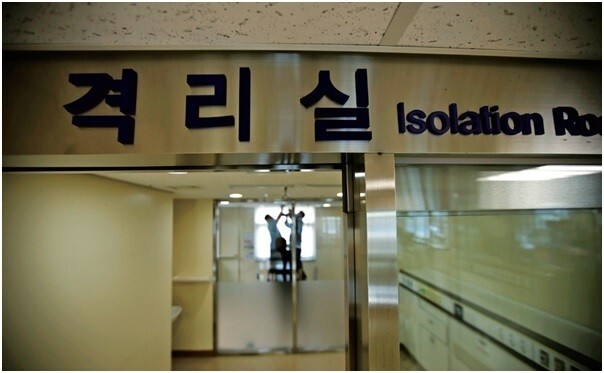hankyoreh
Links to other country sites 다른 나라 사이트 링크
[Reporter’s notebook] Psychological, human-rights concerns raised over electronic wristbands

Being quarantined can lead to fears of infection, financial loss, stigmatization, post-traumatic stress disorder, insomnia, emotional exhaustion, and anger, researchers concluded in a recently published journal article.
These are some of the psychological problems that can be faced by people quarantined for infectious diseases such as COVID-19, warned a paper published in medical journal the Lancet at the end of February. The paper was submitted by a research team led by Samantha Brooks, a post-doctoral researcher at the department of psychological medicine at King’s College London.
The researchers emphasized that, while self-quarantine may be a necessary measure for preventing the spread of disease, it should be approached carefully. Problems created by the failure to take care of the psychological health of quarantined individuals could impose a long-term burden on the entire state’s public health and medical systems, they advised.
As the coronavirus pandemic drags on, health experts are focusing more attention on the psychological health of people in self-quarantine and residents in regions that have been locked down. In an Apr. 9 contribution to the World Economic Forum, Elke Van Hoof, a professor of health psychology at the Vrije Universiteit Brussel (VUB), stressed the need to focus on the psychological health impact on the lockdown and quarantine policies being implemented in many countries.
In South Korea, one individual in their 20s committed suicide while in self-quarantine on Apr. 8 after arriving in South Korea from Europe on Apr. 4. Police are currently ascertaining the exact reasons for the suicide, but experts have been cautiously suggesting that psychological health may have been a factor, explaining that “the isolation situation may influence suicidal urges.” Because of the significant burden that quarantining places on psychological health, local governments in Seoul, Sejong, and elsewhere have been establishing psychological support systems for individuals in self-isolation.
Civil society fiercely objects to electronic wristbands, worrying about exacerbation of mental health burdens
Recently, controversy has been raging over the government’s plan to use electronic wristbands on individuals who violate self-quarantine guidelines. Civil society objected fiercely to the announcement of plans to apply “security bands” to monitor those violating quarantine guidelines -- accounting for just 106 of the 56,856 total people currently in self-quarantine as of Apr. 10.
The fear is that the social stigma of wearing an electronic wristband could exacerbate the psychological health burden of being quarantined. Authorities explained that the measure had already been adopted in Hong Kong -- but even there, wristbands have only applied to Hong Kongers arriving from overseas for two-week periods. The measure was adopted as a supplement due to the inability to stop overseas Hong Kongers returning home.
While the government has since altered its approach to apply only to those violating quarantine guidelines, even that approach has been questioned on legal grounds. Is it too much to ask for a cautious approach to disease prevention that takes the feelings of self-quarantine individuals into account?
By Lee Jae-ho, staff reporter
Please direct comments or questions to [english@hani.co.kr]

Editorial・opinion
![[Column] Season 2 of special prosecutor probe may be coming to Korea soon [Column] Season 2 of special prosecutor probe may be coming to Korea soon](https://flexible.img.hani.co.kr/flexible/normal/500/300/imgdb/original/2024/0426/3317141030699447.jpg) [Column] Season 2 of special prosecutor probe may be coming to Korea soon
[Column] Season 2 of special prosecutor probe may be coming to Korea soon![[Column] Park Geun-hye déjà vu in Yoon Suk-yeol [Column] Park Geun-hye déjà vu in Yoon Suk-yeol](https://flexible.img.hani.co.kr/flexible/normal/500/300/imgdb/original/2024/0424/651713945113788.jpg) [Column] Park Geun-hye déjà vu in Yoon Suk-yeol
[Column] Park Geun-hye déjà vu in Yoon Suk-yeol- [Editorial] New weight of N. Korea’s nuclear threats makes dialogue all the more urgent
- [Guest essay] The real reason Korea’s new right wants to dub Rhee a founding father
- [Column] ‘Choson’: Is it time we start referring to N. Korea in its own terms?
- [Editorial] Japan’s rewriting of history with Korea has gone too far
- [Column] The president’s questionable capacity for dialogue
- [Column] Are chaebol firms just pizza pies for families to divvy up as they please?
- [Column] Has Korea, too, crossed the Rubicon on China?
- [Correspondent’s column] In Japan’s alliance with US, echoes of its past alliances with UK
Most viewed articles
- 1‘We must say no’: Seoul defense chief on Korean, USFK involvement in hypothetical Taiwan crisis
- 2AI is catching up with humans at a ‘shocking’ rate
- 3S. Korea “monitoring developments” after report of secret Chinese police station in Seoul
- 4The dream K-drama boyfriend stealing hearts and screens in Japan
- 5[Column] Can we finally put to bed the theory that Sewol ferry crashed into a submarine?
- 6[Editorial] Yoon cries wolf of political attacks amid criticism over Tokyo summit
- 7Doubts remain over whether Yoon will get his money out of trip to Japan
- 8[Photo] “Comfort woman” survivor calls on president to fulfill promises
- 9[Editorial] Was justice served in acquittal of Samsung’s Lee Jae-yong?
- 10Is N. Korea threatening to test nukes in response to possible new US-led sanctions body?